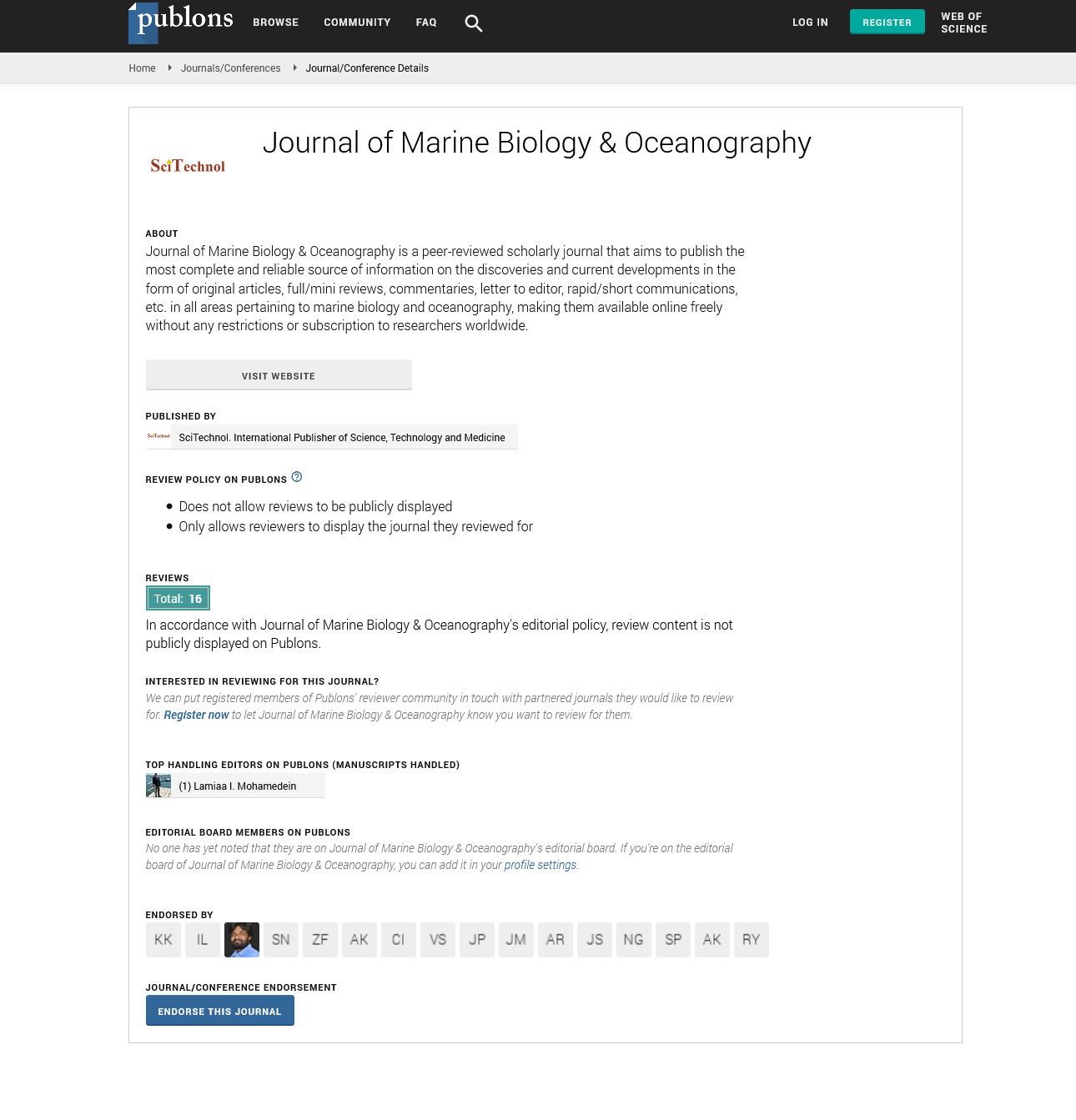Commentary, J Mar Biol Oceanogr Vol: 12 Issue: 1
Aquatic Realm: Exploring the Science of Water
Haiyan Feng*
Department of Aquatic Bioscience, University of Tokyo, Tokyo, Japan
*Corresponding Author: Haiyan Feng
Department of Aquatic Bioscience, University of Tokyo, Tokyo, Japan;
E-mail: haiyanpeng@ut.jp
Received date: 14 February, 2023, Manuscript No. JMBO-23-95202;
Editor assigned date: 16 February, 2023, PreQC No JMBO-23-95202 (PQ);
Reviewed date: 03 March, 2023, QC No. JMBO-23-95202;
Revised date: 10 March, 2023, Manuscript No. JMBO-23-95202 (R);
Published date: 20 March, 2023, DOI: 0.4172/2324-8661.1000251.
Citation: Feng H (2023) Aquatic Realm: Exploring the Science of Water. J Mar Biol Oceanogr 12:1.
Abstract
Description
Water is a remarkable substance that covers the majority of our planet's surface, and its properties and processes have been interested for centuries. The study of aquatic science delves into the intricate world of water, encompassing a wide range of disciplines that explore its unique characteristics, behaviours, and impacts on the planet. One of the fundamental aspects of aquatic science is the study of water properties [1,2]. Water is known for its unique physical and chemical properties, such as its high heat capacity, surface tension, and ability to dissolve a wide range of substances. Aquatic science studies these properties to understand the process by which water influences the behaviour of aquatic systems [3]. For example, water's high heat capacity helps to regulate temperatures in aquatic environments, buffering against rapid temperature changes that could impact aquatic organisms. Water's surface tension allows insects like water striders to walk on water and affects the exchange of gases between the atmosphere and water bodies. The ability of water to dissolve substances, such as oxygen and nutrients, influences the availability of essential elements for aquatic life [4].
The hydrological cycle, or the water cycle, is another important focus of aquatic science. The water cycle describes the continuous movement of water through different phases (solid, liquid, and gas) and between various reservoirs, such as oceans, rivers, lakes, groundwater, and the atmosphere [5,6]. Aquatic science also encompasses the study of aquatic ecosystems, which are complex and dynamic systems composed of living (biotic) and non-living (abiotic) components. Aquatic ecosystems include diverse habitats, such as rivers, lakes, wetlands, estuaries, coral reefs, and deep oceans, each with its unique characteristics and species assemblages. It involves the structure and function of aquatic ecosystems, including the interactions between different organisms, nutrient cycling, energy flow, and ecosystem services [7]. Aquatic ecosystem dynamics, including the interactions between different organisms and their physical environment, are also a central focus of aquatic science. Aquatic ecosystems are complex and dynamic systems that are influenced by a myriad of factors, such as temperature, water flow, nutrient availability, and human activities [8]. It investigates the interrelationships between biotic (living) and abiotic (non-living) components of aquatic ecosystems. For example, changes in water temperature due to climate change can have profound effects on the distribution and abundance of aquatic species, which can in turn influence food webs and ecosystem dynamics. The study of aquatic biodiversity is also an important aspect of aquatic science. Aquatic ecosystems are home to a staggering array of species, from microscopic plankton to majestic whales, and provide habitat for numerous plants, animals, and microorganisms [9,10]. Aquatic science also plays a vital role in addressing the challenges and impacts of human activities on aquatic systems. Human activities, such as pollution, habitat destruction, overfishing, and climate change, pose significant threats to aquatic ecosystems and the services they provide to society [11]. Aquatic science studies the impacts of human activities on water quality, habitat degradation, biodiversity loss, and ecosystem services, and work towards developing strategies for sustainable water management and conservation.
Conclusion
Aquatic science is a multidisciplinary field that plays a vital role in understanding the complex and dynamic nature of aquatic ecosystems. Climate change is affecting aquatic systems in numerous ways, including rising temperatures, changing precipitation patterns, sea level rise, and ocean acidification. It studies the effects of climate change on aquatic ecosystems, such as changes in species distributions, changes in ecosystem dynamics, and repercussions on coastal communities.
 Spanish
Spanish  Chinese
Chinese  Russian
Russian  German
German  French
French  Japanese
Japanese  Portuguese
Portuguese  Hindi
Hindi 
